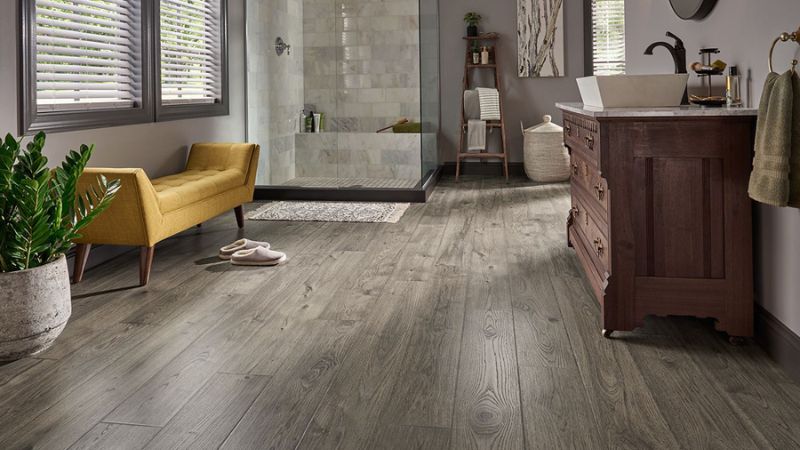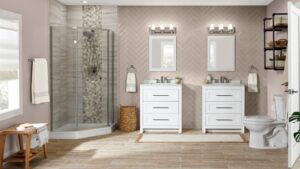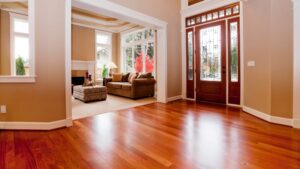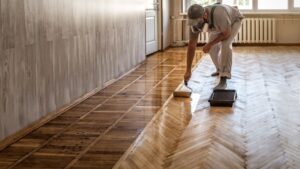Waterproof hardwood flooring solutions – Waterproof hardwood flooring is revolutionizing the traditional concept of hardwood flooring by offering superior resistance to moisture, spills, and stains. As an innovative solution, it combines the timeless appeal of hardwood with modern waterproofing technology, providing homeowners and businesses with a durable and stylish flooring option.
This type of flooring is particularly valuable in areas prone to moisture exposure, such as kitchens, bathrooms, and basements, where traditional hardwood might be susceptible to damage. By integrating waterproofing features into hardwood flooring, manufacturers have addressed a longstanding concern, expanding the possibilities for where hardwood can be installed and enhancing its longevity.
In this outline, we will explore the various types of waterproof hardwood flooring available, advantages over traditional hardwood, important considerations when choosing, installation processes, maintenance tips, popular brands and products, as well as real-life case studies to illustrate its practical application and benefits. Waterproof hardwood flooring represents a significant advancement in flooring technology, offering both functionality and aesthetic appeal for modern living spaces.
Waterproof hardwood flooring solutions
Engineered Hardwood Flooring
Engineered hardwood flooring consists of multiple layers of wood, with a thin veneer of real hardwood on top. The layers are bonded together using heat and pressure, resulting in a stable and durable product. To make engineered hardwood more resistant to moisture, manufacturers often incorporate waterproof cores or apply water-resistant coatings.
This enhances its ability to withstand water damage and makes it suitable for installation in areas prone to moisture, such as bathrooms, kitchens, and basements. Engineered hardwood offers the beauty of real wood with added durability and moisture resistance, making it a popular choice for homeowners seeking waterproof flooring solutions.
Also, Read – Custom Hardwood Flooring Designs
Luxury Vinyl Planks (LVP)

Luxury vinyl planks (LVP) are a versatile and waterproof flooring option that mimics the look of hardwood. Made from synthetic materials, such as PVC and fiberglass, LVP is highly durable and resistant to moisture, making it ideal for wet areas like bathrooms and kitchens. It comes in a wide range of styles, colors, and textures, allowing homeowners to achieve the aesthetic appeal of hardwood without worrying about water damage or maintenance issues.
LVP is also easy to install, often featuring a click-lock mechanism that snaps the planks together without the need for adhesive. Its affordability, durability, and waterproof properties have made LVP a popular choice in modern home design.
Luxury Vinyl Tiles (LVT)
Luxury vinyl tiles (LVT) offer the same waterproof benefits as LVP but come in tile form instead of planks. Like LVP, LVT is made from synthetic materials that are highly resistant to moisture, making it suitable for areas prone to water exposure.
LVT comes in a variety of designs that replicate the look of natural hardwood, stone, or ceramic tiles, providing homeowners with endless options to enhance their interior spaces. Its ease of installation, durability, and low maintenance requirements make it a practical choice for busy households seeking stylish and waterproof flooring solutions. Whether installed in bathrooms, kitchens, or basements, LVT provides the beauty of natural materials without the worry of water damage.
Porcelain Wood-Look Tile
Porcelain wood-look tile combines the timeless appeal of hardwood with the durability and waterproof properties of porcelain. Made from clay and other natural materials, porcelain tile is fired at high temperatures to create a dense and water-resistant product. The surface of porcelain wood-look tile is designed to mimic the texture and appearance of real wood, providing a realistic alternative to hardwood flooring. Its waterproof nature makes it ideal for areas prone to moisture, such as bathrooms, kitchens, and laundry rooms. Porcelain wood-look tile is also scratch-resistant and easy to clean, making it a practical and stylish flooring option for modern homes.
Waterproof Hardwood Sealants
Waterproof hardwood sealants provide an additional layer of protection to traditional hardwood flooring, enhancing its resistance to moisture and water damage. These sealants are typically applied to the surface of the wood and penetrate the grain, forming a protective barrier against spills, leaks, and humidity.
While no hardwood flooring can be completely waterproof, sealants can significantly reduce the risk of water-related issues such as warping, cupping, and mold growth. It’s essential to choose a high-quality sealant suitable for the specific type of hardwood and follow the manufacturer’s instructions for proper application and maintenance. Regular reapplication may be necessary to maintain the effectiveness of the sealant over time.
Bamboo Flooring

Bamboo flooring offers a sustainable and water-resistant alternative to traditional hardwood. Bamboo is a fast-growing grass that matures quickly, making it an environmentally friendly choice for flooring material. Strand-woven bamboo, in particular, is highly durable and water-resistant due to its manufacturing process, which involves compressing bamboo fibers with adhesives under high pressure.
This results in a dense and hard surface that can withstand moisture and humidity without warping or damage. Bamboo flooring comes in a variety of styles and finishes, ranging from natural to carbonized, allowing homeowners to achieve their desired aesthetic while enjoying the benefits of waterproof flooring in areas prone to water exposure.
Cork Flooring
Cork flooring offers natural water resistance and eco-friendliness, making it a unique and sustainable option for homeowners seeking waterproof flooring solutions. Cork is harvested from the bark of cork oak trees, which naturally regenerate after harvesting, making it a renewable resource. The cellular structure of cork contains a waxy substance called suberin, which repels water and prevents moisture absorption. This inherent water resistance makes cork flooring suitable for areas with high humidity or occasional spills, such as kitchens, bathrooms, and basements. Cork flooring is also comfortable to walk on, thanks to its cushioned surface, and provides excellent thermal and acoustic insulation, enhancing the overall comfort and ambiance of a room.
WPC (Wood Plastic Composite) Flooring
WPC flooring is a waterproof alternative to traditional hardwood that combines wood fibers and plastic polymers to create a durable and water-resistant product. The core layer of WPC flooring is typically made from a mixture of wood flour, plasticizers, and foaming agents, which provides stability and waterproofing properties.
This composite construction allows WPC flooring to withstand moisture without warping, cupping, or expanding, making it suitable for areas prone to water exposure, such as bathrooms, kitchens, and basements. WPC flooring is available in a wide range of styles and finishes, including options that mimic the look of natural hardwood, allowing homeowners to achieve their desired aesthetic while enjoying the benefits of waterproof flooring.
SPC (Stone Plastic Composite) Flooring
SPC flooring is an innovative waterproof flooring solution that combines stone powder with plastic polymers to create a rigid and waterproof core. The stone powder provides added strength and durability, making SPC flooring highly resistant to water damage, impacts, and wear and tear. This composite construction also allows for greater dimensional stability, preventing the flooring from expanding or contracting in response to changes in temperature and humidity. SPC flooring is available in a wide range of designs and styles, including options that replicate the look of natural hardwood, stone, and tile. Its waterproof properties and low maintenance requirements make SPC flooring an excellent choice for areas with high moisture levels or heavy foot traffic.
Rubber Wood Flooring

Rubber wood flooring, also known as parawood, is derived from the rubber tree and offers natural resistance to moisture, making it a suitable option for waterproof flooring. Rubber wood is harvested from rubber tree plantations once they reach the end of their latex-producing life cycle, making it an eco-friendly and sustainable choice.
The inherent water resistance of rubber wood makes it suitable for areas prone to water exposure, such as bathrooms, kitchens, and laundry rooms. Rubber wood flooring is available in a variety of styles and finishes, ranging from natural to stained, allowing homeowners to achieve their desired aesthetic while enjoying the benefits of waterproof flooring.
Conclusion
Conclusion: In conclusion, waterproof hardwood flooring presents a groundbreaking solution marrying the elegance of hardwood with the practicality of waterproofing technology. Its resistance to moisture, durability, and aesthetic versatility make it an ideal choice for various spaces. By considering factors like budget, installation requirements, and long-term durability, consumers can make informed decisions.
Regular maintenance and choosing reputable brands ensure the flooring’s longevity. As technology evolves, we anticipate even more innovative advancements in waterproof flooring. With its blend of style and functionality, waterproof hardwood flooring continues to redefine interior design possibilities for residential and commercial spaces alike.
FAQs
What is waterproof hardwood flooring?
Waterproof hardwood flooring is a type of flooring that incorporates technology to make it resistant to water damage. It combines the aesthetic appeal of hardwood with waterproofing features, making it suitable for areas prone to moisture exposure.
How does waterproof hardwood flooring differ from traditional hardwood?
Traditional hardwood flooring is not inherently resistant to water damage and can warp or buckle when exposed to moisture. Waterproof hardwood flooring, on the other hand, is designed to withstand water, spills, and stains, making it suitable for high-moisture areas like kitchens and bathrooms.





